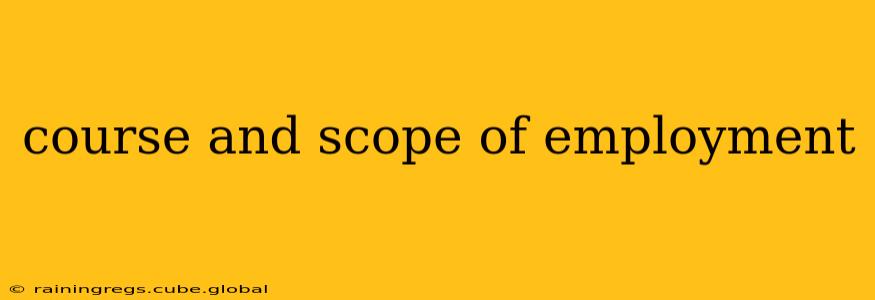Defining the course and scope of employment is crucial for both employers and employees. It sets clear expectations, minimizes misunderstandings, and protects the rights of all parties involved. This comprehensive guide will delve into the key aspects of understanding your job description, ensuring a productive and legally sound working relationship.
What is the Course of Employment?
The "course of employment" refers to the actions an employee undertakes while performing their job duties. It encompasses the tasks, responsibilities, and activities directly related to their employment contract. This isn't simply limited to the specific tasks listed in a job description; it also includes reasonable and foreseeable activities undertaken to fulfill those duties. For instance, a sales representative's course of employment includes not only making sales calls but also attending industry conferences or traveling to client meetings. Understanding the boundaries of your course of employment is vital, as actions outside this scope might not be covered by employer liability insurance or employment protections.
What is the Scope of Employment?
The "scope of employment" is closely related but slightly different. While the course of employment focuses on the activities, the scope of employment defines the authority and responsibility granted to an employee by their employer. It outlines the extent to which an employee can act on behalf of their employer. This is often dictated by factors like job title, experience, and company policies. For example, a junior employee might have a narrower scope of employment than a senior manager, with less authority to make decisions or commit the company to contracts. Understanding your scope is crucial to avoid exceeding your authorized powers, which can have legal and professional consequences.
What are the Differences Between Course and Scope?
While often used interchangeably, there’s a subtle difference:
- Course of Employment: Focuses on the activities undertaken while working. Did the employee perform the action while on the job, in a reasonable manner?
- Scope of Employment: Focuses on the authority given to the employee. Was the employee authorized to perform that action?
An action might fall within the course of employment but outside the scope of employment. Imagine a junior employee making a significant business decision without authorization. The action (course) might have been performed during work hours, but the employee lacked the authority (scope) to make such a decision.
How to Determine Your Course and Scope of Employment?
Understanding your precise course and scope of employment often requires reviewing several documents and engaging in open communication:
- Employment Contract: This is the primary legal document defining the terms of your employment, including your job title, responsibilities, and any limitations on your authority.
- Job Description: While not always legally binding, the job description provides a detailed overview of your expected tasks and responsibilities.
- Company Policies and Procedures: These documents outline the rules and regulations governing employee behavior and actions.
- Employee Handbook: Often contains information about company policies, ethics, and expectations.
- Discussions with Your Supervisor or HR: Open communication with your superiors is essential to clarify any uncertainties about your responsibilities and limits.
How does this impact my liability?
Understanding your scope of employment is critical for liability reasons. If you act outside your scope and cause damage or incur a loss for the company, you could face personal liability. Conversely, if you're acting within your scope, the company usually assumes liability.
What if my duties change?
Employment responsibilities evolve. If your duties change significantly, you should discuss this with your employer to ensure your updated responsibilities are formally documented. This protects both you and the employer.
Conclusion
Clearly understanding your course and scope of employment is vital for a successful and legally sound working relationship. By carefully reviewing your employment documents, engaging in open communication with your employer, and proactively clarifying any uncertainties, you can contribute effectively to your organization while minimizing potential risks. This knowledge empowers you to navigate workplace situations confidently and effectively.
